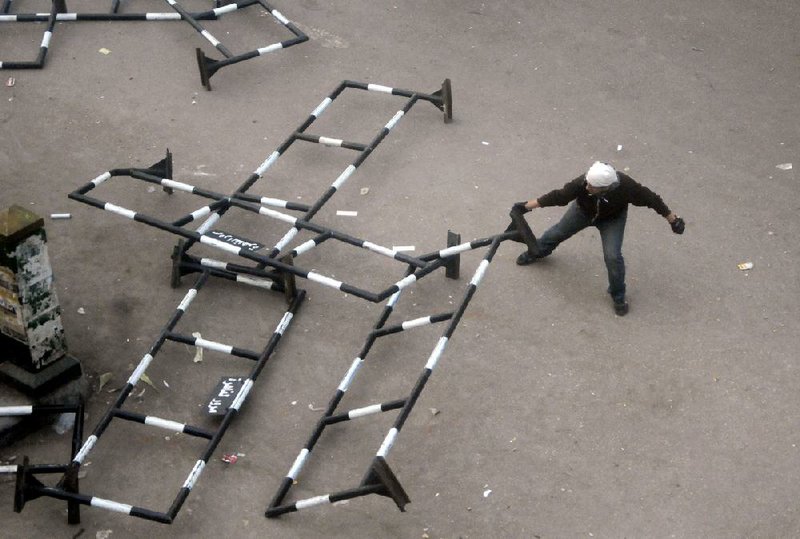CAIRO — The association of judges in Cairo called Saturday for courts across Egypt to suspend all but their most vital activities to protest President Mohammed Morsi’s edict that grants himself unchecked power by setting his decrees above judicial review until the ratification of a new constitution.
The judges’ strike, which drew the support of the leader of the national lawyers’ association, would be the steepest escalation yet in a political struggle between the country’s new Islamist leaders and the institutions of the authoritarian government that was overthrown last year. As it spills into the courts and the streets, the dispute also increasingly threatens to undermine the credibility of Egypt’s political transition.
A council that oversees the judiciary denounced Morsi’s decree, which was issued Thursday, as “an unprecedented attack on judicial independence” and urged the president to retract parts of the decree that eliminate judicial oversight.
State news media reported that judges and prosecutors had already walked out in Alexandria, and there were unconfirmed news reports of walkouts in Qulubiya and Beheira.
Outside Egypt’s high court in Cairo, police fired tear gas at protesters who were denouncing Morsi and trying to force their way into the building, the second day in a row that protesters took to the streets over the presidential decree, which critics have decried as a return to autocracy.
Abdel Meguid Mahmoud, a prosecutor appointed by Morsi’s predecessor, Hosni Mubarak, declared to a crowd of cheering judges that the presidential decree is “null and void.” He denounced what he described as “the systematic campaign against the country’s institutions in general and the judiciary in particular.”
A coalition of disparate opposition leaders, including the liberal former U.N. diplomat Mohamed ElBaradei, the leftist-nationalist Hamdeen Sabahy, and the former Mubarak-government Foreign Minister Amr Moussa, formed a self-proclaimed National Salvation Front to oppose the decree. In addition to demanding the dissolution of the constitutional assembly, the group declared that it will not speak with Morsi until he withdraws his decree.
“We will not enter into a dialogue about anything while this constitutional declaration remains intact and in force,” Moussa said. “We demand that it be withdrawn and then we can talk.”
In an interview with a handful of journalists Saturday, Nobel Peace laureate ElBaradei raised alarm over the effect of Morsi’s rulings, saying he had become “a new pharaoh.”
“There is a good deal of anger, chaos, confusion. Violence is spreading to many places and state authority is starting to erode slowly,” he said.
“We hope that we can manage to do a smooth transition without plunging the country into a cycle of violence. But I don’t see this happening without Mr. Morsi rescinding all of this.”
As the judges’ group called for a suspension of the courts, a growing number of lawyers filed claims demanding that the courts seek to overturn Morsi’s decree, joining the battle between the executive and judicial powers.
Advisers to Morsi, a former leader of the Muslim Brotherhood and Egypt’s first democratically elected president, defended his action, saying he is trying to prevent the courts from disbanding the Islamist-dominated constitutional assembly, which is writing a new constitution.
The nation’s top courts had already dissolved the Islamist-led Parliament and an earlier Islamist-led constituent assembly.
The advisers said a court decision on the new constitutional assembly had been expected as soon as next Sunday.
The judges’ group, as well as the newly unified secular opposition, have demanded that Morsi withdraw his decree, and that he disband and replace the current constitutional assembly.
Many of the assembly’s non-Islamist members, including secularists and representatives of the Coptic Church, had already quit the body to protest the Islamists’ domination.
The increasingly vocal criticism of the assembly threatens to undermine the legitimacy of the ultimate charter, and has only increased the likelihood that the Islamist leaders may seek to pass and ratify it on their own, over the opposition of other groups, further damaging the charter’s credibility.
On Friday night, young supporters of the opposition parties set up a tent city for an open-ended sit-in in Tahrir Square, the center of the Egyptian revolt, and the groups have called for a demonstration there Tuesday.
The Muslim Brotherhood, the Islamist group allied with Morsi, has called for rival demonstrations nearby today and Tuesday, raising the possibility of street fights between the two sides. Morsi has pledged to relinquish his new powers when the constitution is ratified, perhaps as soon as four months from now.
Information for this article was contributed by Nevine Ramzy and Mai Ayyad of The New York Times; and by Hamza Hendawi, Aya Batrawy and Brian Rohan of The Associated Press.
Front Section, Pages 9 on 11/25/2012

